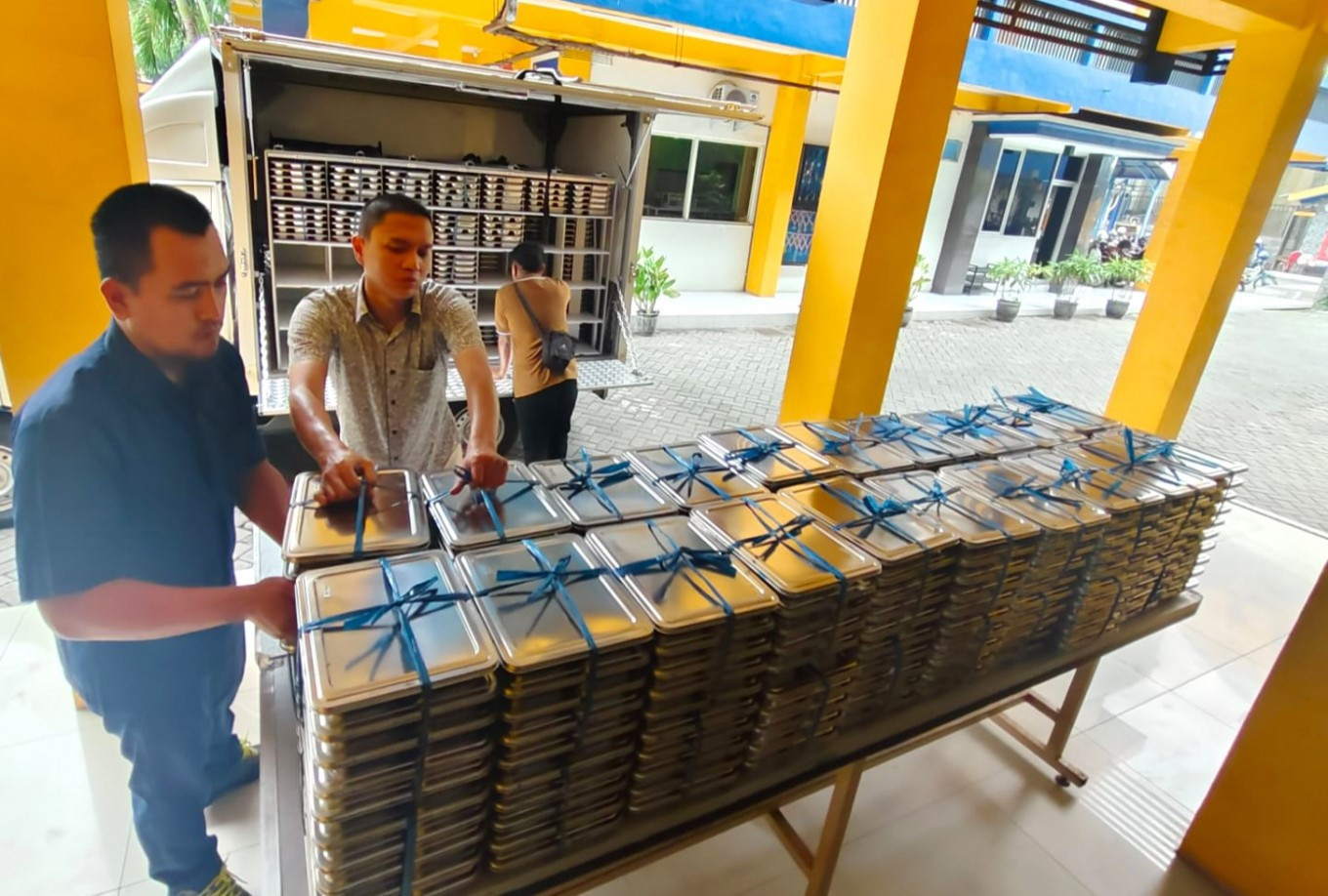News
Indonesia’s free meals program: Teething or structural problems?
Tenggara Strategics April 28, 2025 Ready-to-eat: Workers unload lunch boxes from a van on Jan. 6, 2025, the first day of the free meals program, at a high school in Sidoarjo regency, East Java. (JP/Wahyoe Boediwardhana) (JP/Wahyoe Boediwardhana))
Ready-to-eat: Workers unload lunch boxes from a van on Jan. 6, 2025, the first day of the free meals program, at a high school in Sidoarjo regency, East Java. (JP/Wahyoe Boediwardhana) (JP/Wahyoe Boediwardhana))
Three months since its January 2025 rollout, the government’s free nutritious meal program has encountered many problems on the ground, from reports of food poisoning and small portions with questionable nutritional value to unpaid suppliers and workers, as well as allegations of nepotism in the way the program’s contracts are being parceled out.
The military has also been brought in to assist the program, not so much as to run the security side as helping to set up and run kitchens.
The government might dismiss these as teething problems, but some argue they indicate deeper, fundamental problems with this ambitious program, raising questions about its sustainability.
By March, the program had covered only around 2 million schoolchildren, whereas the government is targeting coverage of all school-age children by November, meaning 82.9 million beneficiaries.
As if meeting this target is not challenging enough, President Prabowo Subianto also wants to expand the program to pregnant women and toddlers aged under 5 years, which means many more million mouths to feed every single day.
Funding is obviously the program’s biggest challenge, but government officials indicate an inclination to dismiss this issue, insisting that the money will become available somehow because this program takes priority over all else.
After all, this is Prabowo’s signature program to fulfill his 2024 election promise to address the country’s perennial stunting problem due to undernourishment and malnourishment.
The program’s initial fund of Rp 70 trillion (US$4.4 billion) in the 2025 state budget was insufficient, so the government promised another Rp 100 trillion, but that figure is still not enough.
Dadan Hindayana, the head of the National Nutrition Agency (BGN) that oversees the program, says the government will be spending at least Rp 1 trillion per day by November to feed 82.9 million schoolchildren nationwide.
His estimate contrasts with that of the Finance Ministry, which is still following the original plan to gradually implement the free meals program over several years. According to this plan, the program aims to provide free meals to 17.9 million beneficiaries in its first year, comprising 15.5 million children and 2.4 million pregnant women.
There is no reason to doubt that the money will be there only because Dadan says so. The more pertinent question is what other national programs or projects will be cut to make that money available.
Spending has been slashed already for infrastructure development, including construction of the new capital city, Nusantara. Civil servants have also felt the brunt of the government’s efficiency policy that includes slashing travel and meeting allowances to near zero. Many government workers relied on these allowances to supplement their meager income, the majority of which is on or just below the official minimum wage.
This series of spending cuts looks to be just the beginning, and more cutbacks and efficiency measures are expected as the BGN rushes to meet the November target of the free meals program.
While the food poisoning that reportedly affected dozens of children in Cisarua, West Java, might be an isolated problem, many similar issues are likely to arise when the program is scaled up unless the question of supervision is addressed now.
The dispute over alleged nonpayment between a supplier and the private foundation contracted to run the program in Kalibata, South Jakarta, suggests potential administrative issues that could plague the program post-expansion.
Further, the government has slashed the cost of a single portion from initially Rp 15,000 (93 cents) to ensure adequate nutrition to Rp 10,000, but some reports say the per-portion cost is actually around Rp 8,000 yet meals are still claimed to be nutritious.
The President has insisted on the program’s universal distribution, meaning that it must cover both public and private schools as well as all children, irrespective of their family’s economic status. He could have made it less costly, more doable, and far more effective by limiting the program to only public schools, like the model in India, or to only children from poor families, as in the United States.
Eyebrows also rose when Tempo reported that many “partner” foundations retained as program administrators by the BGN were closely connected to Prabowo’s inner circle. These foundations in turn contract suppliers to run the kitchens that prepare and distribute meals to schools in their regions.
Critics say attribute the emergence of these and other problems to poor planning and rushing to make the January rollout, before important questions like funding were addressed and administration, supervision and oversight mechanisms were put in place.
Prabowo put his own reputation on the line when he said he would not run for president in 2029 if he was deemed a failure. The public will inevitably judge his performance by the success of his free meals program, so he cannot afford to fail.
What we've heard
A source involved in the selection of partners for the free meals program admits the involvement of Prabowo's relatives and close associates in the project. Allegations of this involvement have been reported in the media based on the foundation deed of the National Solidarity Movement (GNS), a volunteer group supporting Prabowo, which partnered with the BGN.

